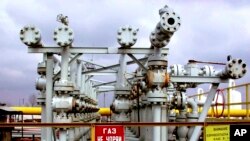European Union energy ministers meet Monday in Brussels as Russia threatens to widen natural gas shutoffs to more countries.
On Wednesday, Russia cut off natural gas supplies to EU member states Poland and Bulgaria, after warning so-called "unfriendly countries" would have to pay for gas in rubles.
The move is seen as a Russian effort to prop up its currency, as most of its EU energy contracts are paid for in dollars or euros.
European Union members responded coolly to Russia's warning.
"It comes as no surprise that the Kremlin uses fossil fuels to try to blackmail us," said European Commission chief Ursula von der Leyen. "This is something the European Commission has been preparing for in close coordination and solidarity with member states and international partners. Our response will be immediate, united and coordinated."
The Russian action comes as European and other Western nations ramp up military support to Kyiv and sanctions against Russia for its invasion of Ukraine.
EU member states have already agreed to phase out Russian coal imports. Germany now says it could also handle a possible Russian oil embargo—which the bloc is now discussing. But there are no immediate plans to cut off Russian gas.
Speaking to French TV Thursday, Foreign Minister Jean-Yves Le Drian of France, whose country currently holds the rotating EU presidency, said a meeting Monday of EU energy ministers aims to find ways to help Poland and Bulgaria get through a difficult period. Brussels also says a new package of Russian sanctions is expected soon.
For now, Poland and Bulgaria are considered to have enough gas for their needs — either stored or acquired from other EU members. Less certain is what happens when colder weather hits—or if Russia halts energy exports to other countries, like Germany or Italy.
That's a concern expressed by Jens Fischer, of Germany's conservative Christian Democratic Union party, in an interview on France 24 TV.
"For the summer we are probably good, and we have enough supply of gas as well," he said. "The next winter is going to be when it bites and also be when the war drags on. I think that is going to be a completely different scenario and question. Hopefully, we have some solutions by then."
Other European politicians also worry about the fallout of sanctions if the war drags on. Already the price of some staples—like Ukraine-sourced sunflower oil—is rising in places like France, where recent presidential elections focused on cost-of-living issues.




